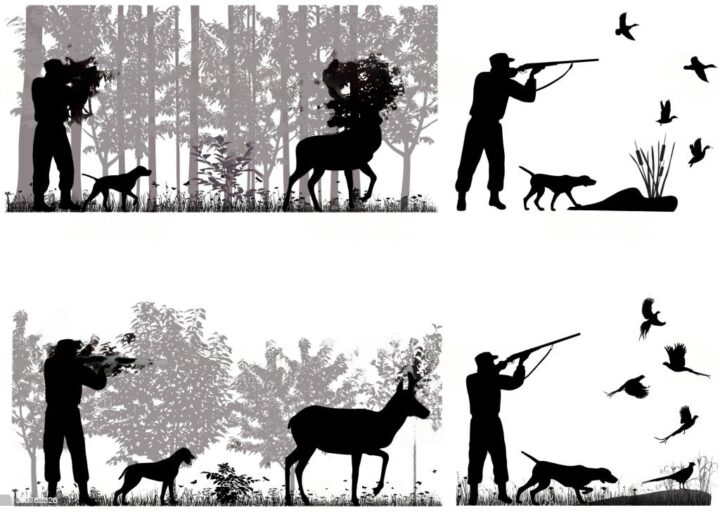Why are hunting regulations passed?
We are all aware that going hunting involves much more than just picking up a gun and getting into the woods. Unless, of course, you aren’t a law-abiding citizen.
Before beginning your hunt, you must first apply for a specific permit and pay a certain fee. These distinctive licenses and permits are what the hunting regulations have introduced.
This article looks at these regulations, their intentions, and who passes them. It will also look at some of the complaints that have been raised regarding the implementation of these hunting regulations.
How Hunting Regulations came to be.
Although the idea existed as early as the 1600s, hunting restrictions were first established in New Jersey In the middle to late 1800s. They were started as a measure to stop outsiders or individuals who were not native to a given land from exploiting the wildlife there.
The rules took the form of a special license that had to be obtained before one could hunt in a certain location. Your license established your residency in that area.
Later, on the authorities saw the opportunity to cash in from the licenses and introduced a special fee of $3 to $5 for any outsider who wanted to hunt in a location where they weren’t a residence.
This trend continued to other states who also saw the need to make money and discriminate against outsiders.
The special license changed once more, and it ceased to be a general license that allowed for the hunting of any wildlife.
Every kind of animal now needed a specific license. For instance, obtaining a deer hunting license in the state of Michigan in 1895 would have cost $25.
Who Comes Up with These Regulations?
Initial enactment of these laws was handled by particular states, through departments such as those in charge of fisheries and wildlife. With time, however, this has changed and even the federal government has established its own regulation through congress.
Where To Find Hunting Regulations?
It is not difficult to locate hunting restrictions because the authorities have made them freely accessible so that every hunter is aware of them.
The state’s publications, agency websites, employees of the state agencies, and booklets handed out at hunting grounds all provide free access to the hunting laws.
If you are planning to take a trip to a particular area the fastest way to obtain the regulations, however, would be to google the hunting laws of that particular area.
If you are planning to go hunting in Wisconsin for example, you can search ‘hunting regulations Wisconsin’. You will get all the details about the rules relevant to that location from the results.
What do the Regulations cover?
Regulations cover different aspects of hunting depending on the jurisdiction where they are enacted. The majority of regulations, however, cover these 5 particular areas.
- The season when the wildlife can be hunted
- The type of methods that one can use to capture the wildlife
- The number of animals that one can capture at one particular time, known as the ‘bag’ limit
- A particular area where the hunting can take place
- The type of wildlife that can, or cannot be captured.
Reasons Hunting Regulations are Passed
As we have noted hunting regulations came to be as a discrimination measure. All these reasons have evolved over time, now the regulations are deemed necessary because of the following reasons.
1. To protect the eco-system
Various forms of hunting are dangerous and disruptive to the ecosystem. This is the use of things like traps to capture animals. Traps are not selective and once set up they can capture any species of wildlife, even that which isn’t intended.
2. Prevent the extinction of particular species
Uncontrolled hunting has almost led to the extinction of species like Bison. The prohibitions against hunting apply to species like these that are scarce and would go extinct if overhunted.
3. Allow for a just pursuit
It would be very unevenly matched if some hunters used unfair methods to capture animals because this would leave none for others. Much like a referee in a game of boxing would prevent one person from wearing steel knuckles.
An example is a hunter using an airplane to locate wildlife, which would hold tremendous advantages over one who is tracking it on foot.
4. To Protect Civilians
In order to prevent loss of life, regulations may forbid entering certain regions where it is known that there are dangerous animals. Hunting can also be prohibited in areas that are close to homes, which could otherwise result in fatalities from stray bullets.
5. Revenue collection
These regulations generate millions of dollars annually. The difficult effort of wildlife conservation requires funding, which can be obtained via the fees charged for permits.
A large portion of these funds might be used for projects like fencing and housing endangered species.
6. Avoid disruptions during mating
The majority of species have hunting restrictions during the breeding season. They might not reproduce if their mating is disrupted, which would lead to a drop in their population and eventually put them in danger.
7. Collect wildlife data
Hunting regulations assist the authorities to collect information on wildlife as well as the ecosystem. This information is vital for conservation efforts.
What Happens If you Break Hunting Regulations?
In order to ensure that hunters take the rules seriously, there are penalties for breaking them. These penalties may take the form of fines, a hunting ban, or even jail time. The repercussions, however, are determined by the offense’s specifics and the location where it occurred.
Disadvantages of Hunting Regulations
Various criticisms have been made by a number of persons despite the regulations’ many benefits. One of the objections is that certain indigenous groups depend on wildlife for their livelihoods, but this is not taken into account by the legislation.
The other objection points to the fact that despite the regulations there is poor enforcement and wildlife aren’t effectively protected. Other people have also complained about the infringement of their rights.
CONCLUSION
An aspiring hunter can better understand why hunting regulations are passed by reading this article, which compiles them in plain language.
The hunter must, however, review the specifics based on where he is located because this article does not address the numerous laws that exist in different jurisdictions. He should also keep up with any changes in regulation that occur in the jurisdiction where he is located.
See Also

